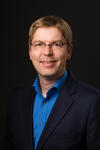Joerg Bewersdorf
Optical instrumentation development for biological imaging: Nanoscopy, Localization Microscopy, PanExM, STED microscopy
Joerg Bewersdorf is a Professor of Cell Biology and of Biomedical Engineering at Yale University. He received his Master’s degree (Dipl. Phys., 1998) and his doctoral degree in physics (Dr. rer. nat., 2002) training with Dr. Stefan W. Hell at the Max Planck Institute for Biophysical Chemistry in Goettingen, Germany. After 4 years at The Jackson Laboratory in Bar Harbor, Maine, he relocated his research group to Yale University in 2009. An optical physicist/biophysicist by training, Dr. Bewersdorf has been a long-time contributor to the field of super-resolution light microscopy development and the application of these techniques to cell biological questions.
Visualizing 3D structure and dynamics at the molecular scale is a current and critical need in biomedical research. Many sub-cellular features, for example the morphology of many organelles or the 3D organization of chromatin, cannot be resolved by standard light microscopy.
Improving the resolution of light microscopy has therefore been an urgent need of biological research for many decades. Today, several methods achieve sub-100 nm resolution by taking advantage of reversible or irreversible photo-physical switching properties of fluorescent markers.
Our research group in the Department of Cell Biology at Yale University School of Medicine is developing new fluorescence microscopy techniques with spatial and/or temporal resolutions going far beyond current technology and also applying them to a diverse set of biological questions.
Specialized Terms: Super-resolution fluorescence microscopy
Extensive Research Description
Our laboratory develops super-resolution Stimulated Emission Depletion (STED) microscopy, Single-molecule Localization Microscopy (FPALM/PALM/STORM/PAINT, etc.) and pan-Expansion Microscopy (pan-ExM) techniques. We are actively developing to improve the capabilities (speed, 3D resolution, robustness, multicolor labeling) of these imaging techniques to expand the application range of super-resolution microscopy. In collaboration with a diverse set of research groups at Yale University and outside, we apply our new instruments to current biomedical questions, in particular related to the endoplasmic reticulum, the Golgi complex, the cell nucleus and cytokinesis.
Research Interests
Cell Nucleus; Endoplasmic Reticulum; Microscopy, Fluorescence; Microscopy, Confocal; Cellular Structures
- Light microscopy of proteins in their ultrastructural context.M’Saad O, Bewersdorf J. Light microscopy of proteins in their ultrastructural context. Nature Communications 2020, 11:3850.
- Nanoscale subcellular architecture revealed by multicolor three-dimensional salvaged fluorescence imaging.Zhang Y, Schroeder LK, Lessard MD, Kidd P, Chung J, Song Y, Benedetti L, Li Y, Ries J, Grimm JB, Lavis LD, De Camilli P, Rothman JE, Baddeley D, Bewersdorf J. Nanoscale subcellular architecture revealed by multicolor three-dimensional salvaged fluorescence imaging. Nature Methods 2020, 17:225-231.
- Dynamic nanoscale morphology of the ER surveyed by STED microscopy.Schroeder LK, Barentine AES, Merta H, Schweighofer S, Zhang Y, Baddeley D, Bewersdorf J, Bahmanyar S. Dynamic nanoscale morphology of the ER surveyed by STED microscopy. The Journal Of Cell Biology 2019, 218:83-96.
- Assessing photodamage in live-cell STED microscopy.Kilian N, Goryaynov A, Lessard MD, Hooker G, Toomre D, Rothman JE, Bewersdorf J. Assessing photodamage in live-cell STED microscopy. Nature Methods 2018, 15:755-756.
- Biological Insight from Super-Resolution Microscopy: What We Can Learn from Localization-Based Images.Baddeley D, Bewersdorf J. Biological Insight from Super-Resolution Microscopy: What We Can Learn from Localization-Based Images. Annual Review Of Biochemistry 2018, 87:965-989.
- Visualization and characterization of individual type III protein secretion machines in live bacteria.Zhang Y, Lara-Tejero M, Bewersdorf J, Galán JE. Visualization and characterization of individual type III protein secretion machines in live bacteria. Proceedings Of The National Academy Of Sciences Of The United States Of America 2017, 114:6098-6103.
- Ultra-High Resolution 3D Imaging of Whole Cells.Huang F, Sirinakis G, Allgeyer ES, Schroeder LK, Duim WC, Kromann EB, Phan T, Rivera-Molina FE, Myers JR, Irnov I, Lessard M, Zhang Y, Handel MA, Jacobs-Wagner C, Lusk CP, Rothman JE, Toomre D, Booth MJ, Bewersdorf J. Ultra-High Resolution 3D Imaging of Whole Cells. Cell 2016, 166:1028-1040.
- Two-colour live-cell nanoscale imaging of intracellular targets.Bottanelli F, Kromann EB, Allgeyer ES, Erdmann RS, Wood Baguley S, Sirinakis G, Schepartz A, Baddeley D, Toomre DK, Rothman JE, Bewersdorf J. Two-colour live-cell nanoscale imaging of intracellular targets. Nature Communications 2016, 7:10778.
- Video-rate nanoscopy using sCMOS camera-specific single-molecule localization algorithms.Huang F, Hartwich TM, Rivera-Molina FE, Lin Y, Duim WC, Long JJ, Uchil PD, Myers JR, Baird MA, Mothes W, Davidson MW, Toomre D, Bewersdorf J. Video-rate nanoscopy using sCMOS camera-specific single-molecule localization algorithms. Nature Methods 2013, 10:653-8.
- Adaptive optics enables 3D STED microscopy in aberrating specimens.Gould TJ, Burke D, Bewersdorf J, Booth MJ. Adaptive optics enables 3D STED microscopy in aberrating specimens. Optics Express 2012, 20:20998-1009.
- Three-dimensional sub-100 nm resolution fluorescence microscopy of thick samples.Juette MF, Gould TJ, Lessard MD, Mlodzianoski MJ, Nagpure BS, Bennett BT, Hess ST, Bewersdorf J. Three-dimensional sub-100 nm resolution fluorescence microscopy of thick samples. Nature Methods 2008, 5:527-9.
- Multifocal multiphoton microscopy.Bewersdorf J, Pick R, Hell SW. Multifocal multiphoton microscopy. Optics Letters 1998, 23:655-7.
